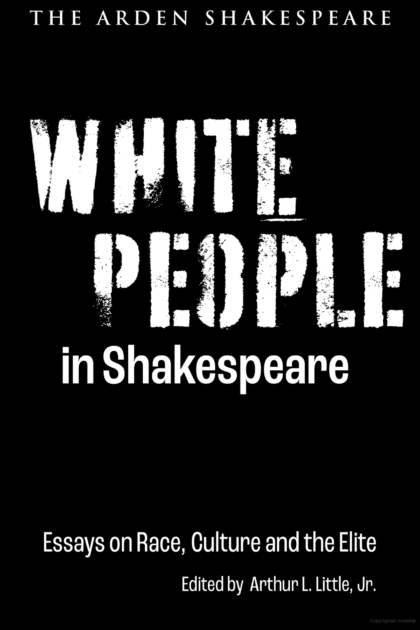Book Reviews
Review of Arthur L. Little Jr.’s White People in Shakespeare: Essays on Race, Culture, and the Elite.
 Arthur L. Little Jr.’s edited collection, White People in Shakespeare: Essays on Race, Culture, and the Elite (London: Bloomsbury 2023), begins with the provocative claim that the work of premodern studies reveals more about the scholar than the world itself—“our work,” he writes, “doesn’t tell how the world is, as much as it haunts, betraying how we truly want the world to look” (17). And for Little, the betrayal lies within critical scholarship’s willfully blind eye to how Shakespeare’s whiteness engenders, comforts, and hedges notions of “white people.” He defines “white people” as a cultural, biopolitical category, a property possessed by the elite and later, a fundamental characteristic of what it meant to be “human” (5). The tension between whiteness as a symbol of superiority and elitism and as a racial category renders whiteness invisibility even to the present; Little points towards the January 6, 2021 riots in Washington, D.C., at the Capitol building as a prime example of “white people” in action.
Arthur L. Little Jr.’s edited collection, White People in Shakespeare: Essays on Race, Culture, and the Elite (London: Bloomsbury 2023), begins with the provocative claim that the work of premodern studies reveals more about the scholar than the world itself—“our work,” he writes, “doesn’t tell how the world is, as much as it haunts, betraying how we truly want the world to look” (17). And for Little, the betrayal lies within critical scholarship’s willfully blind eye to how Shakespeare’s whiteness engenders, comforts, and hedges notions of “white people.” He defines “white people” as a cultural, biopolitical category, a property possessed by the elite and later, a fundamental characteristic of what it meant to be “human” (5). The tension between whiteness as a symbol of superiority and elitism and as a racial category renders whiteness invisibility even to the present; Little points towards the January 6, 2021 riots in Washington, D.C., at the Capitol building as a prime example of “white people” in action.
Thus, this collection is intended as an intervention into both Shakespeare studies and critical whiteness studies. The nexus of Shakespeare and critical whiteness provides not only the theoretical frameworks but the vocabulary itself to discuss the phenomenological and epistemological changes occurring in early modern England that informed the construction of a “white people.” He acknowledges that the recalibration of Shakespeare required to undergo a project such as this monograph has largely only been successful in performance and adaptation, not…
Please login or subscribe to continue reading.
Please subscribe to The Shakespeare Newsletter to continue reading.
Subscribe Now